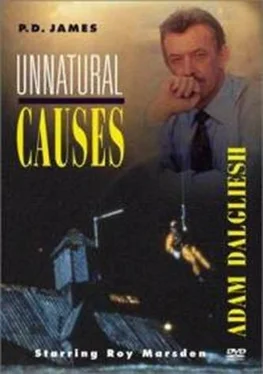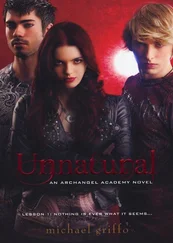P James - Unnatural Causes
Здесь есть возможность читать онлайн «P James - Unnatural Causes» весь текст электронной книги совершенно бесплатно (целиком полную версию без сокращений). В некоторых случаях можно слушать аудио, скачать через торрент в формате fb2 и присутствует краткое содержание. Жанр: Детектив, на английском языке. Описание произведения, (предисловие) а так же отзывы посетителей доступны на портале библиотеки ЛибКат.
- Название:Unnatural Causes
- Автор:
- Жанр:
- Год:неизвестен
- ISBN:нет данных
- Рейтинг книги:4 / 5. Голосов: 1
-
Избранное:Добавить в избранное
- Отзывы:
-
Ваша оценка:
- 80
- 1
- 2
- 3
- 4
- 5
Unnatural Causes: краткое содержание, описание и аннотация
Предлагаем к чтению аннотацию, описание, краткое содержание или предисловие (зависит от того, что написал сам автор книги «Unnatural Causes»). Если вы не нашли необходимую информацию о книге — напишите в комментариях, мы постараемся отыскать её.
Unnatural Causes — читать онлайн бесплатно полную книгу (весь текст) целиком
Ниже представлен текст книги, разбитый по страницам. Система сохранения места последней прочитанной страницы, позволяет с удобством читать онлайн бесплатно книгу «Unnatural Causes», без необходимости каждый раз заново искать на чём Вы остановились. Поставьте закладку, и сможете в любой момент перейти на страницу, на которой закончили чтение.
Интервал:
Закладка:
Jane Dalgliesh said: “Would you like some music? I have the new Mahler recording.”
Dalgliesh wasn’t musical, but he knew that music meant a great deal to his aunt and listening to her records had become part of a Pentlands holiday. Her knowledge and pleasure were infectious; he was beginning to make discoveries. And, in his present mood, he was even ready to try Mahler.
It was then they heard the car. “Oh Lord,” he said. “Who’s this? Not Celia Calthrop, I hope.” Miss Calthrop, if not firmly discouraged, was an inveterate dropper in, trying always to impose on the solitariness of Monksmere the cosy conventions of suburban social life. She was particularly apt to call when Dalgliesh was at the cottage. To her a personable and unattached male was natural prey. If she didn’t want him herself there was always somebody who did; she disliked seeing anything go to waste. On one of his visits she had actually given a cocktail party in his honour. At the time he had enjoyed it, intrigued by the essential incongruity of the occasion. The little group of Monksmere residents, meeting as if for the first time, had munched canapés and sipped cheap sherry in Celia’s pink-and-white drawing room and made inconsequent polite conversation while, outside, a gale screamed across the headland and the sou’westers and storm lanterns were stacked in the hall. Here had been contrast indeed. But it was not a habit to encourage.
Jane Dalgliesh said: “It sounds like Miss Calthrop’s Morris. She may be bringing her niece. Elizabeth is home from Cambridge convalescing from glandular fever. I think she arrived yesterday.”
“Then she ought to be in bed. It sounds as if there are more than two of them. Isn’t that Justin Bryce’s bleat?”
It was. When Miss Dalgliesh opened the door they could see through the porch windows the twin lights of the car and a confusion of dark forms which gradually resolved themselves into familiar figures. It looked as if the whole of Monksmere was calling on his aunt. Even Sylvia Kedge, Maurice Seton’s crippled secretary, was with them, creeping on her crutches towards the stream of light from the open door. Miss Calthrop walked slowly beside her as if in support. Behind them was Justin Bryce, still bleating inconsequently into the night. The tall figure of Oliver Latham loomed up beside him. Last of all, sulky and reluctant, came Elizabeth Marley, shoulders hunched, hands dug into her jacket pockets. She was loitering on the path and peering from side to side into the darkness as if dissociating herself from the party.
Bryce called: “Good evening, Miss Dalgliesh. Good evening, Adam. Don’t blame me for this invasion. It’s all Celia’s idea. We’ve come for professional advice, my dears. All except Oliver. We met him on the way and he’s only come to borrow some coffee. Or so he says.”
Latham said calmly: “I forgot to buy coffee when I was driving from town yesterday. So I decided to call on my one neighbour who could be trusted to provide a decent blend without an accompanying lecture on my inefficient housekeeping. If I’d known you were having a party I might have waited until tomorrow.”
But he showed no inclination to go. They came in, blinking in the light and bringing with them a gust of cold air which billowed the white woodsmoke across the room. Celia Calthrop went straight to Dalgliesh’s chair and arranged herself as if to receive an evening’s homage. Her elegant legs and feet, carefully displayed to advantage, were in marked contrast to her heavy, stoutly corseted body with its high bosom, and her flabby mottled arms. Dalgliesh supposed that she must be in her late forties but she looked older. As always she was heavily but skilfully made up. The little vulpine mouth was carmine, the deep-set and downward-sloping eyes which gave her face a look of spurious spirituality much emphasised in her publicity photographs were blue shadowed, the lashes weighted with mascara. She took off her chiffon headscarf to reveal her hairdresser’s latest effort, the hair fine as a baby’s, through which the glimpses of pink, smooth scalp looked almost indecent.
Dalgliesh had met her niece only twice before and now, shaking hands, he thought that Cambridge had not changed her. She was still the sulky, heavy-featured girl that he remembered. It was not an unintelligent face and might even have been attractive if only it had held a spark of animation.
The room had lost its peace. Dalgliesh reflected that it was extraordinary how much noise seven people could make. There was the usual business of settling Sylvia Kedge into her chair which Miss Calthrop supervised imperiously, although she did nothing active to help. The girl would have been called unusual, perhaps even beautiful, if only one could have forgotten those twisted ugly legs, braced into calipers, the heavy shoulders, the masculine hands distorted by her crutches. Her face was long, brown as a gypsy’s and framed by shoulder-length black hair brushed straight from a centre parting. It was a face which could have held strength and character but she had imposed on it a look of piteous humility, an air of suffering, meekly and uncomplainingly borne, which sat incongruously on that high brow. The great black eyes were skilled in inviting compassion. She was now adding to the general fluster by asserting that she was perfectly comfortable when she obviously wasn’t, suggesting with a deprecating gentleness which had all the force of a command that her crutches should be placed within reach even though this meant propping them insecurely against her knees, and by generally making all present uncomfortably aware of their own undeserved good health. Dalgliesh had watched this play-acting before, but tonight he sensed that her heart wasn’t in it, that the routine was almost mechanical. For once the girl looked genuinely ill and in pain. Her eyes were as dull as stones and there were lines running deeply between her nostrils and the corners of her mouth. She looked as if she needed sleep, and when he gave her a glass of sherry he saw that her hand was trembling. Seized by a spasm of genuine compassion, he wrapped his fingers around hers and steadied the glass until she could drink. Smiling at her he asked gently: “Well, what’s the trouble? What can I do to help?”
But Celia Calthrop had appointed herself spokesman. “It’s too bad of us all to come worrying you and Jane on your first evening together. I do realise that. But we’re very worried. At least, Sylvia and I are. Deeply concerned.”
“While I,” said Justin Bryce, “am not so much worried as intrigued, not to say hopeful. Maurice Seton’s disappeared. I’m afraid it may only be a publicity stunt for his next thriller and that we shall see him among us again all too soon. But let us not look on the gloomy side.”
He did, indeed, look very far from gloomy, squatting on a stool before the fire like a malevolent turtle, twisting his long neck towards the blaze. His had been, in youth, a striking head with its high cheekbones, wide mobile lips and huge luminous grey eyes under the heavy lids. But he was fifty now and becoming a caricature. Though they seemed even larger, his eyes were less bright, and watered perpetually as if he were always fighting against a high wind. The receding hair had faded and coarsened to dull straw. The bones jutted through his skin, giving him the appearance of a death’s head. Only his hands were unchanged. He held them out now to the fire, soft-skinned, white and delicate as those of a girl. He smiled at Dalgliesh: “Lost, believed safe. One middle-aged detective writer. Nervous disposition. Slight build. Narrow nose. Buck teeth. Sparse hair. Prominent Adam’s apple. Finder, please keep… So we come to you for advice, dear boy. Fresh, as I understand it, from your latest triumph. Do we wait for Maurice to make his reappearance and then pretend we didn’t notice that he got lost? Or do we play it his way and ask the police to help us find him? After all, if it is a publicity stunt, it would only be kind to co-operate. Poor Maurice needs all the help in that direction he can get.”
Читать дальшеИнтервал:
Закладка:
Похожие книги на «Unnatural Causes»
Представляем Вашему вниманию похожие книги на «Unnatural Causes» списком для выбора. Мы отобрали схожую по названию и смыслу литературу в надежде предоставить читателям больше вариантов отыскать новые, интересные, ещё непрочитанные произведения.
Обсуждение, отзывы о книге «Unnatural Causes» и просто собственные мнения читателей. Оставьте ваши комментарии, напишите, что Вы думаете о произведении, его смысле или главных героях. Укажите что конкретно понравилось, а что нет, и почему Вы так считаете.












